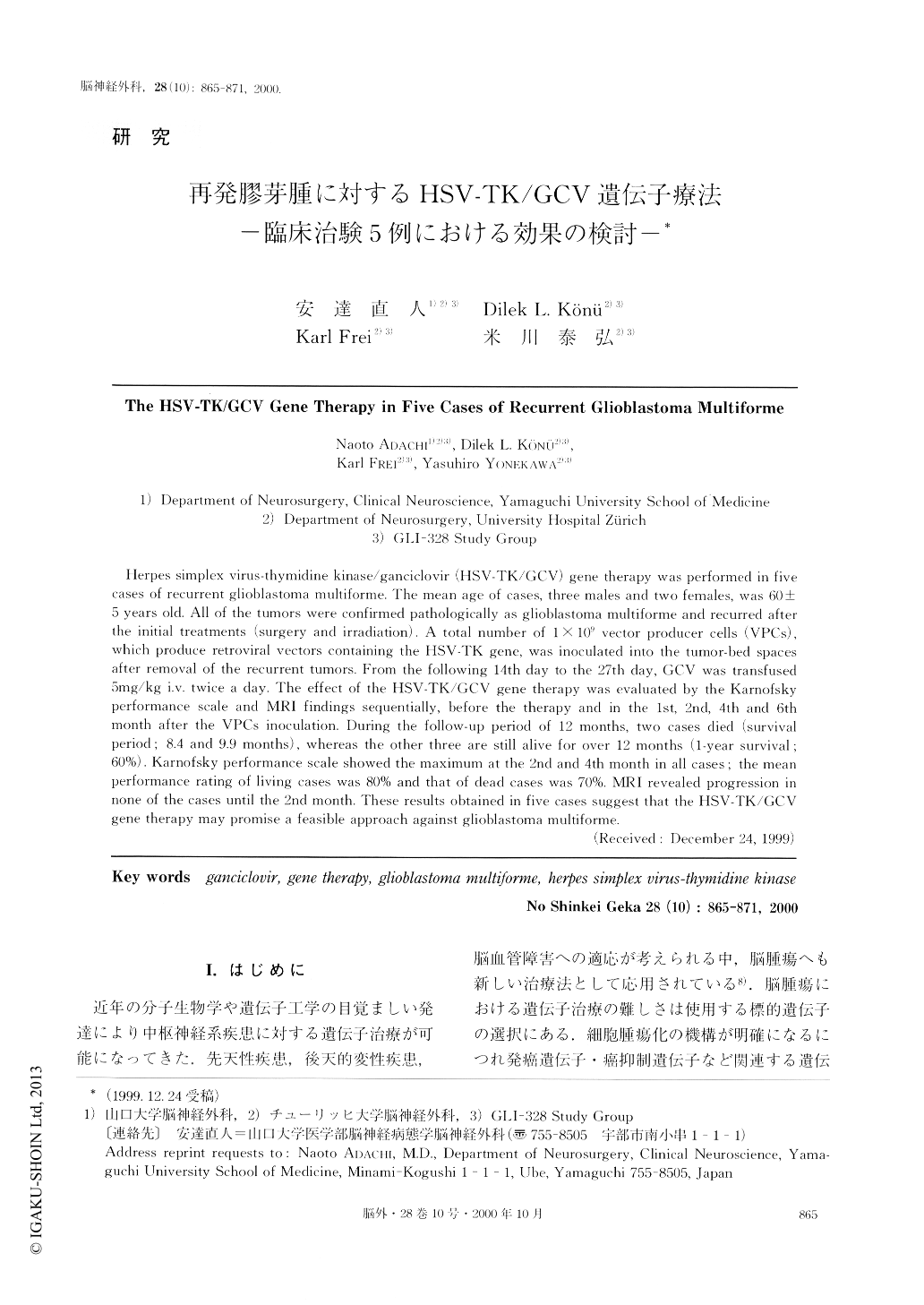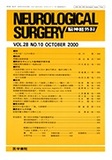Japanese
English
- 有料閲覧
- Abstract 文献概要
- 1ページ目 Look Inside
I.はじめに
近年の分子生物学や遺伝子工学の目覚ましい発達により中枢神経系疾患に対する遺伝子治療が可能になってきた.先天性疾患,後天的変性疾患,脳血管障害への適応が考えられる中,脳腫瘍へも新しい治療法として応用されている8).脳腫瘍における遺伝子治療の難しさは使用する標的遺伝子の選択にある.細胞腫瘍化の機構が明確になるにつれ発癌遺伝子・癌抑制遺伝子など関連する遺伝子群が増え,その相互関係も複雑化してきている14,25-27).選択的かつ効果的な殺細胞効果を示す標的遺伝子の選択が必須と考えられる中,herpes simplex virus-thymidine kinase(HSV-TK)遺伝子とganciclovir(GCV)を利用したHSV-TK/GCV遺伝子療法(いわゆる自殺遺伝子療法)が考案され12,13),すでに臨床応用されている1-3,19,20).この治療法の原理は,レトロウイルスを用いて薬剤(GCV)感受性を示す遺伝子(HSV-TK)を腫瘍細胞に導入し,GCVを投与することにより選択的な殺腫瘍細胞効果を導く方法である12,21).
チューリッヒ大学脳神経外科では1996年から膠芽腫に対するHSV-TK/GCV遺伝子治療を開始した.この治療はNovartis Pharma,Ltd., Basel,Switzerlandとの共同治験(GLI-328 Study Group)として初発例と合わせ再発例に対しても施行している22).今回の臨床治験は再発膠芽腫に対する治療効果と生物学的安全性の検討を目的としているが,本報告では再発膠芽腫5例における治療効果を臨床経過とMRI所見より検討し,今後の臨床応用に当たり改善すべき問題点について考察を加えた.
Herpes simplex virus-thymidine kinase/ganciclovir (HSV-TK/GCV) gene therapy was performed in five cases of recurrent glioblastoma multiforme. The mean age of cases, three males and two females, was 60±5 years old. All of the tumors were confirmed pathologically as glioblastoma multiforme and recurred after the initial treatments (surgery and irradiation). A total number of 1×109 vector producer cells (VPCs), which produce retroviral vectors containing the HSV-TK gene, was inoculated into the tumor-bed spaces after removal of the recurrent tumors. From the following 14th day to the 27th day, GCV was transfused 5mg/kg i. v. twice a day. The effect of the HSV-TK/GCV gene therapy was evaluated by the Karnofsky performance scale and MRI findings sequentially, before the therapy and in the 1st, 2nd, 4th and 6th month after the VPCs inoculation. During the follow-up period of 12 months, two cases died (survival period; 8.4 and 9.9 months), whereas the other three are still alive for over 12 months (1-year survival; 60%). Karnofsky performance scale showed the maximum at the 2nd and 4th month in all cases; the mean performance rating of living cases was 80% and that of dead cases was 70%. MRI revealed progression in none of the cases until the 2nd month. These results obtained in five cases suggest that the HSV-TK/GCV gene therapy may promise a feasible approach against glioblastoma multiforme.

Copyright © 2000, Igaku-Shoin Ltd. All rights reserved.


